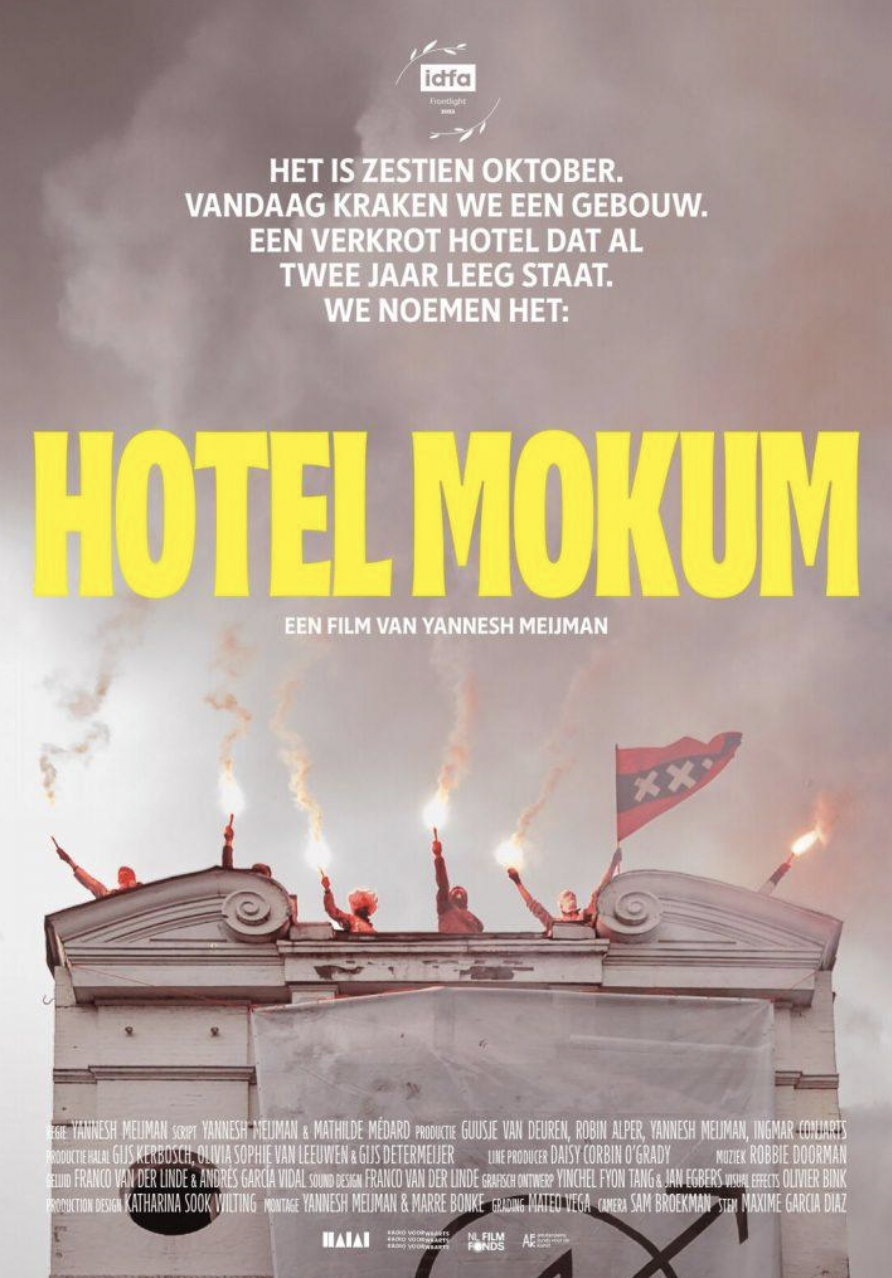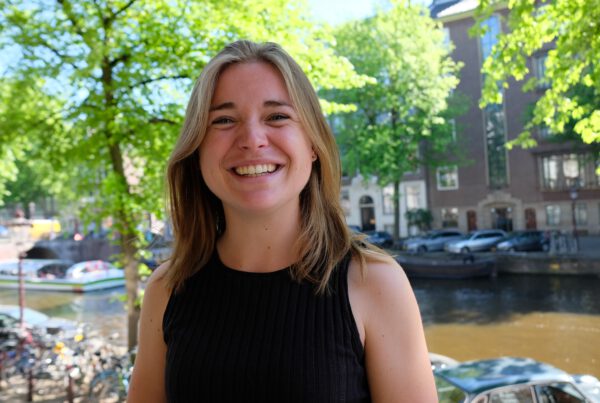

‘Hotel Mokum’, released in October 2023, is a 30-minute Dutch documentary short film directed by Yannesh Meijman and narrated by Maxime Garcia Diaz. The film is a poignant docu-fiction that follows the collective ‘de kinderen van Mokum’ as they defy the rising housing crisis and gentrification in Amsterdam. The narrative centers around the collective’s squatting of a dilapidated hotel on Marnixstraat, transforming it into a vibrant and secure living community and studio where meetings, discussions, and communal events were hosted.
Through the perspective of a fictitious activist, voiced by Maxime Garcia Diaz, and a docu-fictional blend of social media recordings, archived footage, as well as fictional scenes, an immersive experience is created for the viewer. The narration is deeply personal, conveying the passion and dedication of the activists who see their efforts as more than just an act of defiance against the government—Hotel Mokum is their sanctuary, their home in a city without homes.
The collective set their eyes on a hotel on Marnixstraat which had been standing idle. They set out to rehabilitate the neglected hotel by cleaning, refurbishing, and upholstering a place that was now run-down, abandoned, and claimed by pigeons. Upon settling in and making the place their own, they opened it up to others and organized events such as community meals or political discussions.
The real owner of the hotel did not have the financial means to evict and decided to stand by and wait until the city was forced to act. Everyone at Hotel Mokum knew that their days of harmonious existence inside their fortress were numbered. Yet, after six weeks of peaceful squatting, the air was filled with contempt and shock after police in riot gear showed up at their doorstep, ready to tear everything down. The abrupt eviction was justified by the city under the guise of fire safety issues. Everything was over. In a matter of hours, the building once again belonged to no one.
‘For a moment we thought we owned the building forever.’
The collective, calling themselves ‘de kinderen van Mokum’ (the children of Mokum), uses the Yiddish term ‘Mokum’ to affectionately refer to Amsterdam. The term is historically associated with Jewish communities and translates to ‘place’ or ‘safe haven’. The collective’s rebellion against anti-squatting laws serves as a statement against the commodification of living spaces and the marginalization of vulnerable communities. Squatting, or ‘kraken,’ is by no means new to Amsterdam, and the film highlights this long-standing tradition despite anti-squatting laws. The group’s ability to refurbish and transform the building into a place where cultural and political events could be hosted underscores the purpose of their occupation: to show their resilience in fighting unjust laws and creating a home for themselves.
‘Hotel Mokum’ captures both the collective heat of creating something meaningful and the dread of losing everything you have worked for. The viewer is engaged in every action as though they themselves are a part of the squatting and the collective, sharing in their triumphs and defeats. Set against the backdrop of Amsterdam’s housing crisis and gentrification, the film provides a rich picture of the current state of Amsterdam housing, commenting on broader issues of livelihood security and everyone’s right to the city. The ongoing activism of the group, now active on social media under @mokumkraakt, continues to display their support for their cause and related projects. You can keep your eyes open for a rescreening of the movie in one of Amsterdam’s independent cinemas or watch it online via Picl.
The beautiful blend of fact and fiction, making the story of Hotel Mokum come to life once again, is what makes this movie an excellent watch. It provides an intimate perspective filled with emotions of passion and hope that few can normally grasp. The release of this movie reemphasizes an urgent matter that resonates with a wide audience. The film concludes with the collective squatting yet another building, signifying that Hotel Mokum was just one of a plethora of protests in the enduring fight for justice, security, and fairness.
‘You can evict a building, but you can never evict our ideals.’
Directed by: Yannesh Meijman
This film can be watched at Studio K or Prime Video.

‘Hotel Mokum’, released in October 2023, is a 30-minute Dutch documentary short film directed by Yannesh Meijman and narrated by Maxime Garcia Diaz. The film is a poignant docu-fiction that follows the collective ‘de kinderen van Mokum’ as they defy the rising housing crisis and gentrification in Amsterdam. The narrative centers around the collective’s squatting of a dilapidated hotel on Marnixstraat, transforming it into a vibrant and secure living community and studio where meetings, discussions, and communal events were hosted.
Through the perspective of a fictitious activist, voiced by Maxime Garcia Diaz, and a docu-fictional blend of social media recordings, archived footage, as well as fictional scenes, an immersive experience is created for the viewer. The narration is deeply personal, conveying the passion and dedication of the activists who see their efforts as more than just an act of defiance against the government—Hotel Mokum is their sanctuary, their home in a city without homes.
The collective set their eyes on a hotel on Marnixstraat which had been standing idle. They set out to rehabilitate the neglected hotel by cleaning, refurbishing, and upholstering a place that was now run-down, abandoned, and claimed by pigeons. Upon settling in and making the place their own, they opened it up to others and organized events such as community meals or political discussions.
The real owner of the hotel did not have the financial means to evict and decided to stand by and wait until the city was forced to act. Everyone at Hotel Mokum knew that their days of harmonious existence inside their fortress were numbered. Yet, after six weeks of peaceful squatting, the air was filled with contempt and shock after police in riot gear showed up at their doorstep, ready to tear everything down. The abrupt eviction was justified by the city under the guise of fire safety issues. Everything was over. In a matter of hours, the building once again belonged to no one.
‘For a moment we thought we owned the building forever.’
The collective, calling themselves ‘de kinderen van Mokum’ (the children of Mokum), uses the Yiddish term ‘Mokum’ to affectionately refer to Amsterdam. The term is historically associated with Jewish communities and translates to ‘place’ or ‘safe haven’. The collective’s rebellion against anti-squatting laws serves as a statement against the commodification of living spaces and the marginalization of vulnerable communities. Squatting, or ‘kraken,’ is by no means new to Amsterdam, and the film highlights this long-standing tradition despite anti-squatting laws. The group’s ability to refurbish and transform the building into a place where cultural and political events could be hosted underscores the purpose of their occupation: to show their resilience in fighting unjust laws and creating a home for themselves.
‘Hotel Mokum’ captures both the collective heat of creating something meaningful and the dread of losing everything you have worked for. The viewer is engaged in every action as though they themselves are a part of the squatting and the collective, sharing in their triumphs and defeats. Set against the backdrop of Amsterdam’s housing crisis and gentrification, the film provides a rich picture of the current state of Amsterdam housing, commenting on broader issues of livelihood security and everyone’s right to the city. The ongoing activism of the group, now active on social media under @mokumkraakt, continues to display their support for their cause and related projects. You can keep your eyes open for a rescreening of the movie in one of Amsterdam’s independent cinemas or watch it online via Picl.
The beautiful blend of fact and fiction, making the story of Hotel Mokum come to life once again, is what makes this movie an excellent watch. It provides an intimate perspective filled with emotions of passion and hope that few can normally grasp. The release of this movie reemphasizes an urgent matter that resonates with a wide audience. The film concludes with the collective squatting yet another building, signifying that Hotel Mokum was just one of a plethora of protests in the enduring fight for justice, security, and fairness.
‘You can evict a building, but you can never evict our ideals.’
Directed by: Yannesh Meijman
This film can be watched at Studio K or Prime Video.



